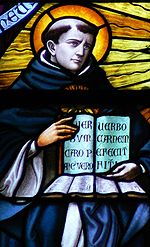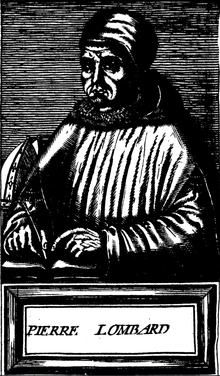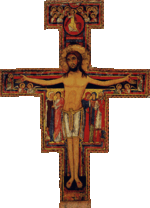- Peter Lombard
-

This file is in the public domain because its copyright has expired in the United States and those countries with a copyright term of no more than the life of the author plus 100 years. Peter Lombard (or Petrus Lombardus) (c. 1100 – July 20, 1160, in Paris) was a scholastic theologian and bishop and author of Four Books of Sentences, which became the standard textbook of theology, for which he is also known as Magister Sententiarum.
Contents
Biography
Peter Lombard was born in Lumellogno[1] (then a rural commune, now a quartiere of Novara, Piedmont), in northwestern Italy, to a poor family.[2] His date of birth was likely between 1095 and 1100.
His education most likely began in Italy at the cathedral schools of Novara and Lucca. The patronage of Odo, bishop of Lucca, who recommended him to Bernard of Clairvaux, allowed him to leave Italy and further his studies at Reims and Paris. Petrus Lombardus studied first in the cathedral school at Reims, where Magister Alberich and Lutolph of Novara were teaching, and arrived in Paris about 1134,[3] where Bernard recommended him[4] to the canons of the church of St-Victor. In Paris, where he spent the next decade teaching at the cathedral school of Notre Dame, he came into contact with Peter Abelard and Hugh of St. Victor, who were among the leading theologians of the time. There are no proven facts relating to his whereabouts in Paris until 1142 when he became recognized as writer and teacher. Around 1145, Peter became a "magister", or professor, at the cathedral school of Notre Dame in Paris. Peter's means of earning a living before he began to derive income as a teacher and from his canon's prebend is shrouded in uncertainty.
Peter Lombard's career
Lombard's style of teaching gained quick acknowledgment. It can be surmised that this attention is what prompted the canons of Notre Dame to ask him to join their ranks. He was considered a celebrated theologian by 1144. The Parisian school of canons had not included among their number a theologian of high regard for some years. The canons of Notre Dame, to a man, were members of the Capetian dynasty, relatives of families closely aligned to the Capetians by blood or marriage, scions of the Ile-de-France or eastern Loire Valley nobility, or relatives of royal officials. In contrast, Peter had no relatives, ecclesiastical connections, and no political patrons in France. It seems that he must have been invited by the canons of Notre Dame solely for his academic merit.
He became a subdeacon in 1147. Possibly he was present at the consistory of Paris in 1147, and certainly he attended the Council of Reims in 1148, where Pope Eugenius III was present at the synod, which examined Gilbert de la Porrée and Eon de l'Estoile. Peter was among the signers of the act condemning Gilbert's teachings.[5] At some time after 1150 he became a deacon, then an archdeacon, maybe as early as 1152. He was ordained priest some time before 1156. In 1159, he was named bishop of Paris. A hostile witness, Walter of St Victor, accused Peter of obtaining the office by simony,[6] though he had no source of income. The more usual story is that Philip, younger brother of Louis VII. and archdeacon of Notre-Dame, was elected by the canons but declined in favor of Peter, his teacher. Peter was consecrated at the feast of SS. Peter and Paul, 28 July 1159.
His reign as bishop was brief.[7] He died on either July 21 or 22, 1160. Little can be ascertained about Lombard's administrative style or objectives because he left behind so few episcopal acta. He was succeeded by Maurice de Sully, the builder of the Cathedral of Notre Dame.[8] His tomb in the church of Saint-Marcel in Paris was destroyed during the French Revolution, but a transcription of his epitaph survives.
Writings
Peter Lombard wrote commentaries on the Psalms and the Pauline epistles; however, his most famous work by far was Libri Quatuor Sententiarum, or the Four Books of Sentences, which became the standard textbook of theology at the medieval universities.[9] From the 1220s until the 16th century, no work of Christian literature, except for the Bible itself, was commented upon more frequently. All the major medieval thinkers, from Albert the Great and Thomas Aquinas to William of Ockham and Gabriel Biel, were influenced by it. Even the young Martin Luther still wrote glosses on the Sentences, and John Calvin quoted from it over 100 times in his Institutes.
Though the Four Books of Sentences formed the framework upon which four centuries of scholastic interpretation of Christian dogma was based, rather than a dialectical work itself, the Four Books of Sentences is a compilation of biblical texts, together with relevant passages from the Church Fathers and many medieval thinkers, on virtually the entire field of Christian theology as it was understood at the time. Peter Lombard's magnum opus stands squarely within the pre-scholastic exegesis of biblical passages, in the tradition of Anselm of Laon, who taught through quotations from authorities.[10] It stands out as the first major effort to bring together commentaries on the full range of theological issues, arrange the material in a systematic order, and attempt to reconcile them where they appeared to defend different viewpoints. The Sentences starts with the Trinity in Book I, moves on to creation in Book II, treats Christ, the saviour of the fallen creation, in Book III, and deals with the sacraments, which mediate Christ's grace, in Book IV.
Doctrine
Peter Lombard's most famous and most controversial doctrine in the Sentences was his identification of charity with the Holy Spirit in Book I, distinction 17. According to this doctrine, when the Christian loves God and his neighbour, this love literally is God; he becomes divine and is taken up into the life of the Trinity. This idea was never declared unorthodox, but few theologians have been prepared to follow Peter Lombard in his audacious teaching. Compare Pope Benedict XVI's encyclical Deus Caritas Est, 2006.
Also in the Sentences was the doctrine that marriage was consensual (and need not be consummated to be considered perfect, unlike Gratian's analysis). Lombard's interpretation was later endorsed by Pope Alexander III, and had a significant impact on Church interpretation of marriage.
Notes
- ^ Hödl, in Biografisch-Bibliografisches Kirchenlexikon.
- ^ The few known facts of Peter's life are presented in Philippe Delhaye, Pierre Lombard: sa vie, ses œuvres, sa morale (Paris/Montreal) 1961.
- ^ Hödl
- ^ In a surviving letter, Ep. 410, Opera omnia viii.391, noted by Hödl
- ^ Hödl.
- ^ In his polemic Contra quatuor labyrinthos Franciae II.4.
- ^ His successor, Maurice de Sully, was bishop by the end of 1160.
- ^
 "Peter Lombard". Catholic Encyclopedia. New York: Robert Appleton Company. 1913.
"Peter Lombard". Catholic Encyclopedia. New York: Robert Appleton Company. 1913. - ^ Joseph Rickaby (1908). Scholasticism. A. Constable. p. 23.
- ^ This is a central point of Delhaye 1961, who sees Abelard, rather than Peter, as the founder of scholasticism.
English translation
- The Sentences. Book 1: The Mystery of the Trinity. Translated by Giulio Silano. Toronto, Pontifical Institute of Mediaeval Studies (PIMS), 2007. LVIIII, 278 pp. ISBN 978–0–88844–292–5
- The Sentences. Book 2: On Creation. Translated by Giulio Silano. Toronto, PIMS, 2008. XLVI, 236 pp. ISBN 978–0–88844–293–2
- The Sentences. Book 3: On the Incarnation of the Word. Translated by Giulio Silano. Toronto, PIMS, 2008. XLVIII, 190 pp. ISBN 978–0–88844–295–6
- The Sentences. Book 4: The Doctrine of Signs. Translated by Giulio Silano. Toronto, PIMS, 2010. 336 pp. ISBN 978–0–88844–296–3
External links
- "Peter Lombard (1095-1160)" article in the Internet Encyclopedia of Philosophy
- Ludwig Hödl (1993). Bautz, Traugott. ed (in German). Lombardus, Petrus. Biographisch-Bibliographisches Kirchenlexikon (BBKL). 5. Herzberg. cols. 197–202. ISBN 3-88309-043-3. http://www.bautz.de/bbkl/l/lombardus.shtml.
- "Peter Lombard Magister Sententiarum" Texts and further links.
- Peter Lombard's Book of Sentences in parallel Latin English (Book I)
- Online Galleries, History of Science Collections, University of Oklahoma Libraries High resolution images of works by Peter Lombard in .jpg and .tiff format.
Bibliography
- Colish, Marcia L. Peter Lombard. 2 Vols. New York: E.J. Brill, 1994.
- Delhaye, Philippe. Pierre Lombard: sa vie, ses œuvres, sa morale. Paris/Montreal: 1961.
- Herlihy, David. Medieval Households. Cambridge: Harvard UP, 1985.
- Rosemann, Philipp W. Peter Lombard. New York: Oxford UP, 2004.
- Rosemann, Philipp W. The Story of a Great Medieval Book: Peter Lombard's "Sentences". Peterborough, Ontario: Broadview, 2007.
History of the Catholic Church General History of the Catholic Church · History of the Papacy · History of the Roman Curia · Catholic Ecumenical Councils · Timeline of the Catholic Church · History of Christianity · Role of the Catholic Church in Western civilization · Art in Roman Catholicism · Catholic religious order · Christian monasticism · Papal States
Church beginnings Constantine the Great to
Pope Gregory IConstantine the Great and Christianity · Arianism · Basilica of St. John Lateran · First Council of Nicaea · Pope Sylvester I · First Council of Constantinople · Biblical canon · Jerome · Vulgate · First Council of Ephesus · Council of Chalcedon · Benedict of Nursia · Second Council of Constantinople · Pope Gregory I · Gregorian chant
Early Middle Ages Third Council of Constantinople · Saint Boniface · Byzantine Iconoclasm · Second Council of Nicaea · Charlemagne · Pope Leo III · Fourth Council of Constantinople · East–West Schism
High Middle Ages Pope Urban II · Investiture Controversy · Crusades · First Council of the Lateran · Second Council of the Lateran · Third Council of the Lateran · Pope Innocent III · Latin Empire · Francis of Assisi · Fourth Council of the Lateran · Inquisition · First Council of Lyon · Second Council of Lyon · Bernard of Clairvaux · Thomas Aquinas
Late Middle Ages Protestant Reformation/
Counter-ReformationBaroque Period to the
French Revolution19th century Pope Pius VII · Pope Pius IX · Dogma of the Immaculate Conception of the Virgin Mary · Our Lady of La Salette · Our Lady of Lourdes · First Vatican Council · Papal infallibility · Pope Leo XIII · Mary of the Divine Heart · Prayer of Consecration to the Sacred Heart · Rerum Novarum
20th century Pope Pius X · Our Lady of Fátima · Persecutions of the Catholic Church and Pius XII · Pope Pius XII · Pope Pius XII Consecration to the Immaculate Heart of Mary · Dogma of the Assumption of the Virgin Mary · Pope John XXIII · Second Vatican Council · Pope Paul VI · Pope John Paul I · Pope John Paul II
21st century By country or region Brazil · Cuba · France · Germany · Hispano-America · Ireland · Japan · Mexico · Spain · United States · Venezuela
History of Catholic theology Theologians · Teachings · HeresiesGeneral History History of the Catholic Church · Early Christianity · History of the Papacy · Ecumenical Councils · Timeline of the Catholic Church · History of Christianity · History of Christian theology
Church beginnings First Epistle of Clement · Didache · Ignatius of Antioch · Epistle of Barnabas · Justin Martyr · Irenaeus · Tertullian · Origen · Antipope Novatian · CyprianConstantine to
Pope Gregory IEarly Middle Ages Monothelitism · Ecthesis · Iconoclasm · Transubstantiation dispute · Predestination disputes · John Scotus EriugenaHigh Middle Ages Thomas Aquinas · Thomism · Roscellinus · Anselm of Canterbury · Peter Abelard · Decretum Gratiani · Bernard of Clairvaux · Peter Lombard · Hildegard of Bingen · Dominic de Guzmán · Francis of Assisi · Bonaventure · Albertus MagnusMysticism & Reforms Protestant Reformation and
Counter-ReformationBaroque Period to
French RevolutionJacques-Bénigne Bossuet · Francisco Suárez · François Fénelon · Jansenism · Blaise Pascal · Alphonsus Maria de Liguori · Louis de Montfort · Alfonso Muzzarelli · Louis Thomassin · Jean de La Fontaine19th century 20th-21st century Categories:- 1100s births
- 1160 deaths
- University of Paris alumni
- Christian theologians
- People from the Province of Novara
- Italian theologians
- Scholastic philosophers
- 12th-century Latin writers
- Bishops of Paris
- 12th-century Roman Catholic bishops
- Christian mystics
Wikimedia Foundation. 2010.


